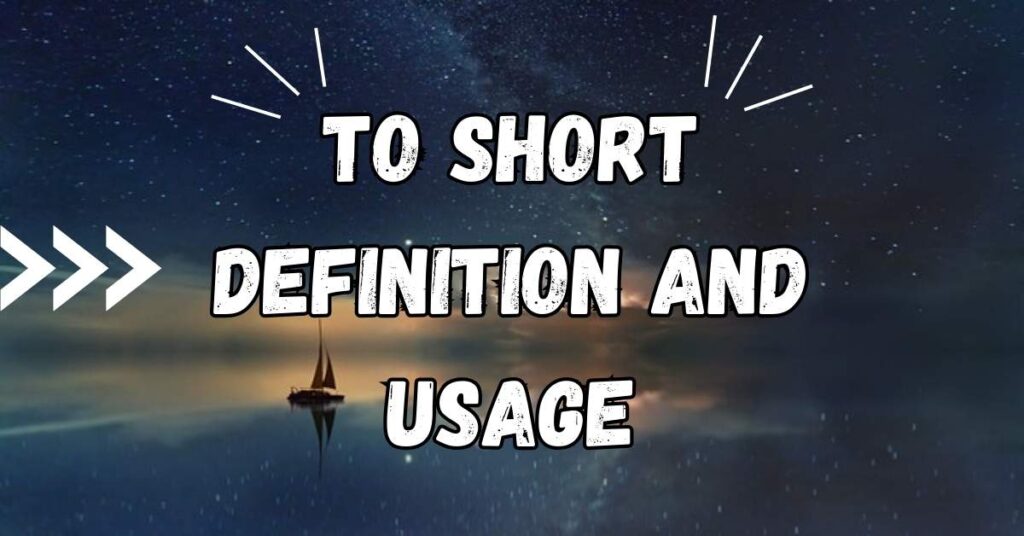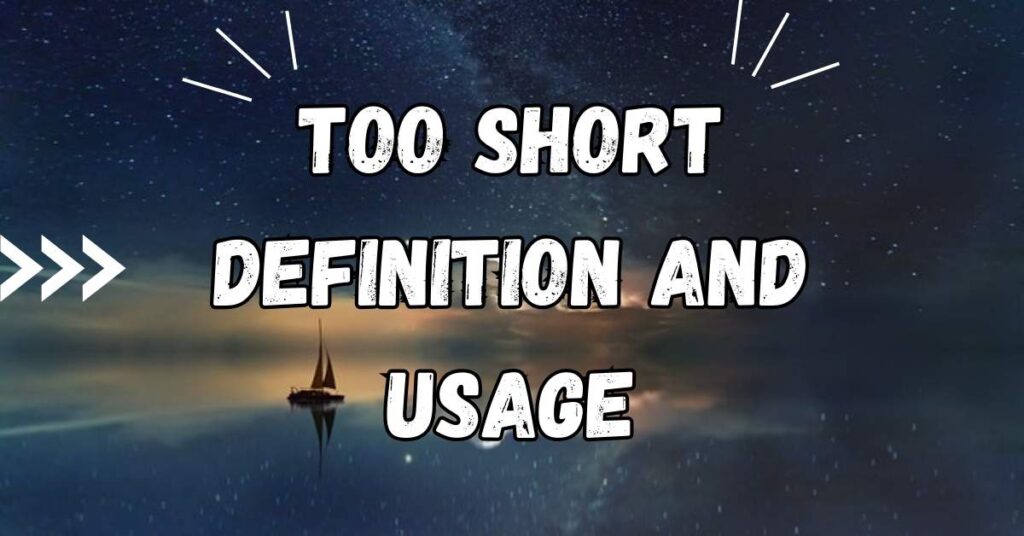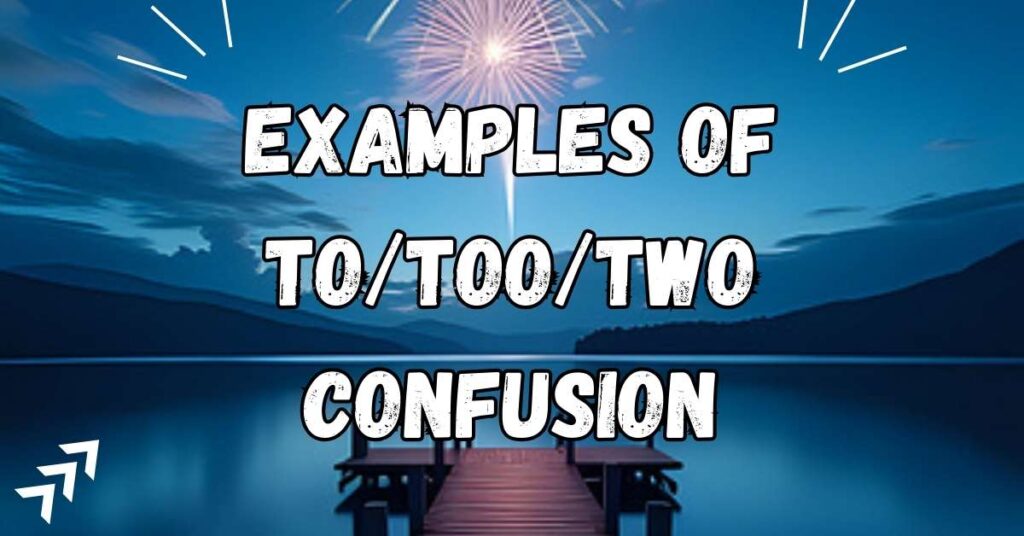To short or too short this common confusion can trip up even seasoned writers. Understanding the difference between these phrases is crucial for effective communication in English.
While “too short” indicates something that is excessively brief or lacking in length, “to short” is often a grammatical error that can lead to misunderstandings.
This article will explore the meanings, usages, and common pitfalls associated with these terms. By clarifying their definitions and providing practical examples, you’ll gain the skills needed to avoid grammatical mistakes and enhance your writing accuracy.
Let’s dive into the nuances of these phrases and improve your command of the English language.
Quick Summary
Difference between “to short” and “too short,” two commonly confused phrases in English. Understanding their meanings and proper usage is crucial for effective communication. By mastering these distinctions, you can improve your writing accuracy and avoid frequent grammatical mistakes in everyday language.
Understanding To Short or Too Short

“To short” and “too short” may seem similar, but they serve different purposes in the English language. “To short” is not a standard phrase; it often arises from confusion or incorrect usage. On the other hand, “too short” is a commonly used expression that means something is excessively brief or lacking in length.
For example, when someone says, “The dress is too short,” they imply that the dress does not provide adequate coverage. This distinction is crucial for maintaining writing accuracy and ensuring your message is clear.
The Root of the Problem
The confusion between “to short” and “too short” often stems from their phonetic similarities. Both phrases sound alike when spoken, which can lead to misunderstandings in written communication.
This issue highlights a broader challenge in English: the presence of homophones words that sound the same but have different meanings.
In this case, “to” functions as a preposition or infinitive verb, while “too” serves as an adverb modifying adjectives or other adverbs. Recognizing these differences is vital for avoiding grammatical errors.
Breaking Down “To” and “Too”
The word “to” can function as a preposition or indicate an infinitive verb form. For instance, in the sentence “I want to go,” “to” connects the verb “want” with its action. Conversely, “too” acts as an adverb indicating excessiveness or addition.
For example, in “She is too tired,” it modifies the adjective “tired,” suggesting that her level of fatigue exceeds what is normal or acceptable. Understanding these grammatical functions helps prevent common mistakes.
To Short: Definition and Usage

While many might use “to short” mistakenly, it does not hold any formal definition in standard English grammar. Instead, it often appears in sentences where speakers intend to express something being insufficiently long or brief.
For example, someone might say, “The movie was to short,” intending to convey their disappointment with its length. However, this usage is incorrect and should be avoided for clarity.
5 Synonyms of To Short
Although “to short” lacks a proper definition, one could consider some synonyms for conveying similar meanings related to brevity or inadequacy:
- Insufficient
- Inadequate
- Limited
- Minimal
- Brief
Too Short: Definition and Usage

In contrast, “too short” clearly conveys that something does not meet an expected length or duration. It implies an excessiveness that detracts from usability or comfort.
For instance, if someone says, “These pants are too short,” they mean that the pants do not reach an appropriate length for wearability.
Too Meanings
The word “too” carries multiple meanings based on context. Primarily, it signifies excessiveness indicating something surpasses normal limits as seen in phrases like “too much” or “too little.”
Additionally, it can mean “also,” as in “I want pizza too.” Understanding these meanings enhances our ability to use “too” effectively in various sentences.
Too Meanings in Different Contexts
In different contexts, “too” can take on various implications:
- In clothing: “This shirt is too small,” indicating it doesn’t fit.
- In time: “We finished too early,” suggesting completion ahead of schedule.
- In emotions: “I feel too happy,” expressing overwhelming joy.
Recognizing these contexts helps avoid confusion and ensures accurate communication.
The Versatility of “Too”
The versatility of “too” allows it to modify different parts of speech effectively. It enhances adjectives and adverbs by providing additional meaning about degree or extent. For example:
- “She runs too fast for me.”
- “He speaks too quietly during presentations.”
This adaptability makes it essential for clear expression in both spoken and written language.
The Impact on Tone
Using “too short” vs “to short” significantly affects tone in communication. When you say something is “too short,” you convey dissatisfaction or concern about its adequacy. Conversely, using “to short” sounds awkward and may confuse your audience about your intended message.
When to Use “Too Short”

To use “too short” correctly, ensure you are describing something lacking sufficient length or duration. This could apply to clothing items like skirts or pants that do not fit properly or time frames that are insufficient for completing tasks.
The Role of “Too” as a Modifier
As an adverb modifying adjectives and other adverbs, “too” plays a crucial role in enhancing meaning within sentences. It provides clarity about how much more than what is considered normal or acceptable something is.
5 Synonyms of Too Short
When discussing something being excessively brief or inadequate in length, consider these synonyms:
- Excessively brief
- Not long enough
- Undersized
- Inadequately short
- Lacking length
These alternatives can enrich your vocabulary while discussing similar concepts without falling into grammatical pitfalls.
Side by Side Comparison
Here’s a quick comparison table illustrating the differences between “to short” and “too short”:
| Term | Definition | Usage Example |
| To Short | Incorrect usage; not standard | N/A |
| Too Short | Excessively short | The dress is too short for me. |
This table encapsulates how one term lacks validity while the other serves a clear purpose.
Everyday Usage Examples

Understanding the difference between “to short” and “too short” is crucial for clear communication. These phrases often appear in everyday conversations. Recognizing their correct usage can help you avoid common grammatical mistakes and enhance your writing accuracy in various contexts.
“To Short” Example
Example of incorrect usage is, “The presentation was to short,” which implies the speaker is dissatisfied with its length. This phrase lacks grammatical validity, leading to confusion. Using “to short” can undermine the clarity of your message and create misunderstandings.
Examples in Context
- The report was to short for a thorough analysis.
- His explanation was to short, lacking necessary details.
- The meeting felt to short, leaving many questions unanswered.
- That movie was to short for my liking.
- The essay turned out to short to meet the requirements.
“Too Short” Example
Correct usage example is, “The dress is too short for formal events.” In this case, “too short” effectively conveys that the dress does not provide adequate coverage. This phrase clearly communicates dissatisfaction with the item’s length, ensuring the message is understood.
Examples in Context
- The skirt is too short for the winter weather.
- His response was too short, lacking depth and insight.
- The deadline is too short to complete the project thoroughly.
- This story feels too short, missing a satisfying conclusion.
- The rope is too short to reach the top of the tree.
Examples of “To/Too/Two” Confusion

Many people also confuse similar-sounding words like “to,” “two,” and “too.” These homophones can lead to significant misunderstandings if used incorrectly in writing.
For instance:
- Using “two” when you mean “to”: “I am going two the store.”
- Using “to” instead of “too”: “This task is too difficult.”
Awareness of these common errors enhances overall writing clarity.
The Spell Check Problem
Spell checkers often fail to catch misuse between these terms because they do not flag homophones as errors unless they are misspelled outright. Therefore, relying solely on spell check can lead to persistent grammatical mistakes if one does not understand the context behind each word’s usage.
Understanding Each Word
Each word “to,” “two,” and “too” carries distinct meanings and functions within sentences:
- To: A preposition indicating direction.
- Two: The number 2.
- Too: An adverb indicating excessiveness.
Understanding their unique roles aids in avoiding confusion during writing tasks.
Practice and Vigilance
Practicing vigilance when using these terms will help ensure clarity in your writing and speaking endeavors. Regularly reviewing your work for such common mistakes can significantly enhance your language skills over time.
The Incorrect “To Short”
While some may attempt to use “to short,” this phrase lacks legitimacy within standard English grammar rules and should be avoided altogether for clear communication.
Applying the Rule
Applying correct usage rules involves recognizing when you need an adjective modifier (use “too”) vs when you should avoid using an incorrect phrase (like “to short”). Familiarizing yourself with these distinctions will improve your overall writing quality.
How to Use Correctly “Too Short” and Avoid Common Mistakes

To use “too short” correctly:
- Identify whether you are describing something lacking adequate length.
- Ensure you are modifying an adjective appropriately with “too.”
- Avoid using “to short” altogether as it does not convey any meaningful message.
By following these guidelines, you will enhance your writing accuracy significantly.
Common Misuses in Everyday Writing
Common misuses occur frequently among writers who may overlook grammatical nuances due to haste or lack of understanding about homophones like “to/too/two.” Recognizing these pitfalls allows for better writing practices moving forward.
Common Reasons for Confusion
Reasons people confuse these terms include phonetic similarities and lack of familiarity with their grammatical functions within sentences, a challenge many face while learning English grammar rules effectively.
How to Avoid the Error?
To avoid errors involving “to/too/two”:
- Take time to proofread your work carefully.
- Consider each word’s role before finalizing your sentences.
- Practice regularly with exercises focused on homophones for mastery over time.
By implementing these strategies into your writing routine consistently, you’ll reduce mistakes significantly over time.
Read More Article: Privilege or Priviledge: Which One is Correct?
Tips to Help You Remember
A few helpful tips include counting the Os: More Os mean it’s likely “too.” Additionally, think about context: does it imply excess? If yes, use “too.”
By keeping these simple reminders at hand during writing tasks will help reinforce proper word usage naturally over time.
Strategies for Mastery
Mastering correct usage involves consistent practice paired with exposure through reading diverse materials where proper grammar shines through clearly. Engaging with resources such as grammar guides online can also provide valuable insights into effective expression strategies.
Memory Techniques
Creative memory aids such as visualizing scenarios where each term applies can enhance retention.
For example: Picture someone wearing pants that are “too small”
By associating vivid imagery with words will help solidify understanding while avoiding confusion later on.
Read More Article: Challenge or Challange: What’s the Difference?
FAQs: To Short or Too Short
Is it too correct or to correct?
The correct phrase is “too,” as “too” indicates excessiveness, while “to” is a preposition.
What is a word for too short?
A synonym for “too short” is “insufficient,” which conveys a lack of adequate length or duration.
How do you use too short notice in a sentence?
You can say, “I can’t attend the meeting due to too short notice,” indicating that the time given was insufficient to prepare.
What is too short notice?
“Too short notice” refers to a situation where the amount of time provided to prepare or respond is inadequate, making it difficult to act appropriately.
Conclusion
Mastering the difference between to short or too short is essential for clear and effective communication in English. Understanding that “too short” signifies something excessively brief, while “to short” is an incorrect usage, can enhance your writing accuracy and prevent grammatical mistakes.
By practicing these distinctions and incorporating the correct terms into your writing, you will improve not only your grammar skills but also your overall communication clarity. Embrace these insights to express yourself confidently and accurately in every situation.
Related Posts: Tomorrow or Tommorrow: What’s the Difference?

